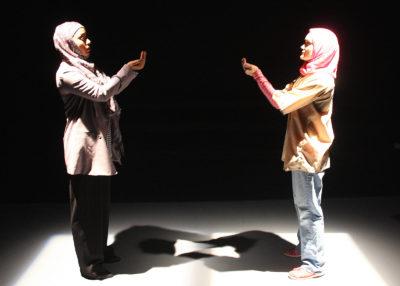
In the wake of recent events that have caused an increase in Islamophobia and this year’s proposed Muslim ban by the Trump administration, artists across mediums have found various ways to express their feelings about today’s society.
One of the reactions to today’s political and social climate is “Faceless,” the most current show at the Zeitgeist Stage Company that will be running until Oct. 7.
According to their website, Zeitgeist Stage Company aims to establish an environment where artists can showcase their talents through timely and relevant productions. Contemporary plays and historic plays that reflect contemporary life are typically shown at the company.
“The name of the stage company aligns with our mission” said David Miller, founder and artistic director of Zeitgeist Stage Company. “The word zeitgeist means, ‘spirit of the times,’ and I thought ‘Faceless’ was timely and appropriate in the age of a Trump presidency. It addresses relevant issues about faith, Muslims, acceptance and the role of social media.”
Written by recent Northwestern University graduate, Selina Fillinger, “Faceless” tells the story of Susie Glenn, an 18-year-old girl who is on trial for conspiring to commit an act of terrorism, and Claire Fathi, a recent Harvard Law graduate and Muslim woman who is the prosecutor of her trial.
Ultimately, it is a show that explores identity politics and questions of faith.
“I was inspired to write this play after reading an article about a white, Colorado girl from the suburbs who was arrested for trying to join ISIS,” Fillinger said. “This girl defied everything the media tells us a terrorist is, looks like and comes from.”
After conducting research, the playwright discovered that the incident with the Colorado girl wasn’t isolated and that other people from the the United States and Europe were joining ISIS, the Islamic State in Iraq and Syria. Fillinger said she is fascinated that individuals across race, gender and even people with no religious affiliation were joining the terrorist group.
Throughout the entire writing process, Fillinger said she was in communication with the Muslim community in Chicago and interviewed many Muslim women. She got feedback from Muslim scholars who were also in constant communication with Northlight Theatre, where “Faceless” first premiered during their 2016-17 season.
But Fillinger does not identify as Muslim. Despite this, she said she believes that her meticulous research — including reading the Quran and several articles — gave her the tools to write a play from the experience of Muslim women.
“I don’t believe in the ‘write-what-you-know’ trope because it underestimates us,” Fillinger said. “The core human emotions don’t change but circumstances do. I know love and you know love. I know pain and you know pain; but research is required to understand circumstances.”
As the show’s director, Miller said he hopes that audiences will leave the production with a more balanced view of Islam, especially since many might not be too knowledgeable about the religion.
“The production does a good job of balancing the message of non-violent Muslims versus radical Muslims; and shows that non-violent Muslims are integrated into all levels of American [life] within different roles and professions,” explained Miller. “The message is that not all Muslims are bad people which is how Trump seems to paint them with his recent Muslim ban.”
Hind Halim, a junior in Boston University’s College of Arts and Sciences, said she believes that there are many misunderstanding about the Muslim community which leads to them being vilified.
“Everything is taken out of context,” Halim said. “Phrases from the Quran are taken out of context and sometimes, even acts of terrorism are taken out of context. Many times the good acts of the Muslim community get unnoticed. So, it’s important to have the arts shed light on religious issues that have the power to tear our society apart”.”
In addition to deconstructing people’s views on Islam and the Muslim community, Miller said she believes the play is important because it centers strong female actresses.
“It’s a very worthwhile show to experience because it touches on so many topics,” Miller said. “The response from the audience has been timely, thought provoking and engaging. It’s entertaining, engaging theatre. I hope people get an opportunity to experience it over the next three weeks.”























































































































